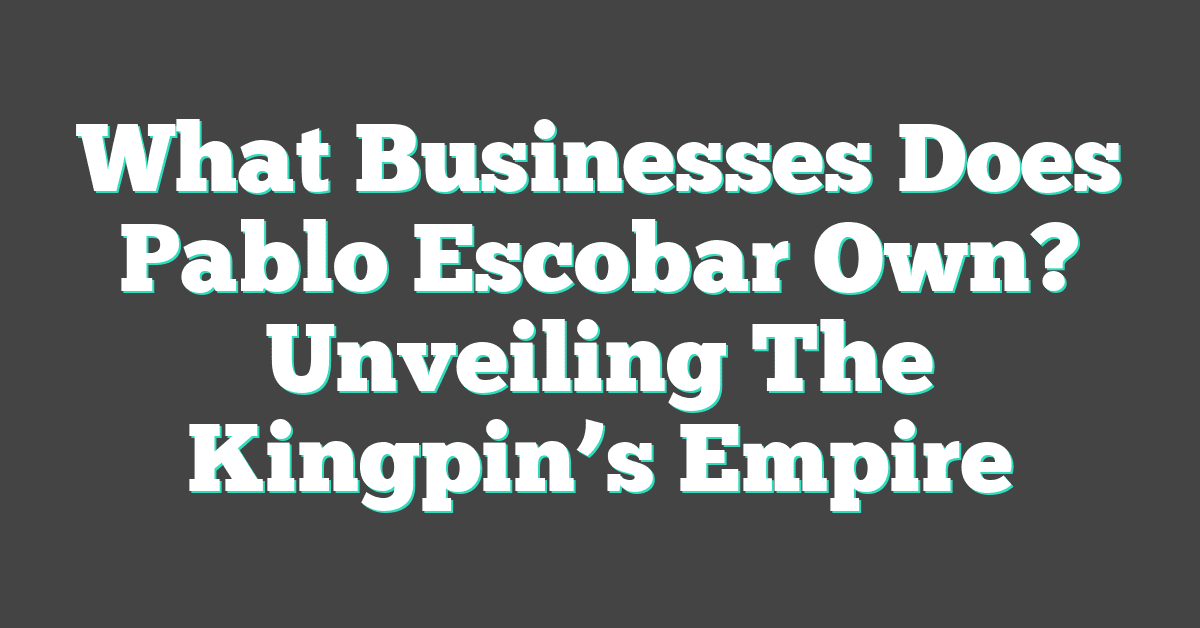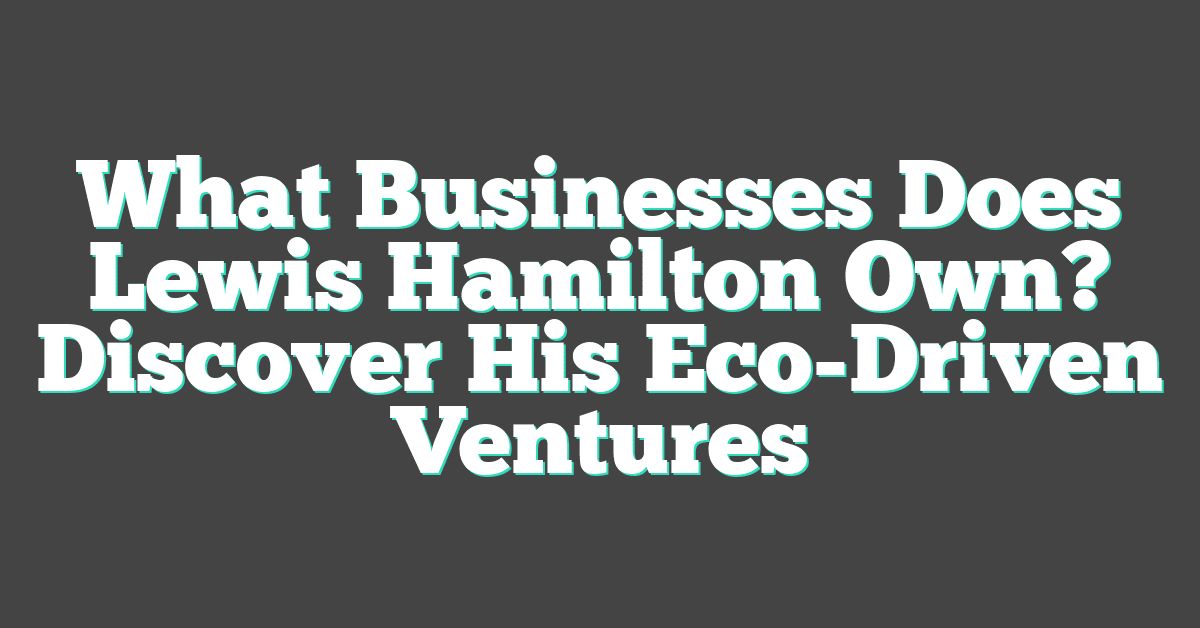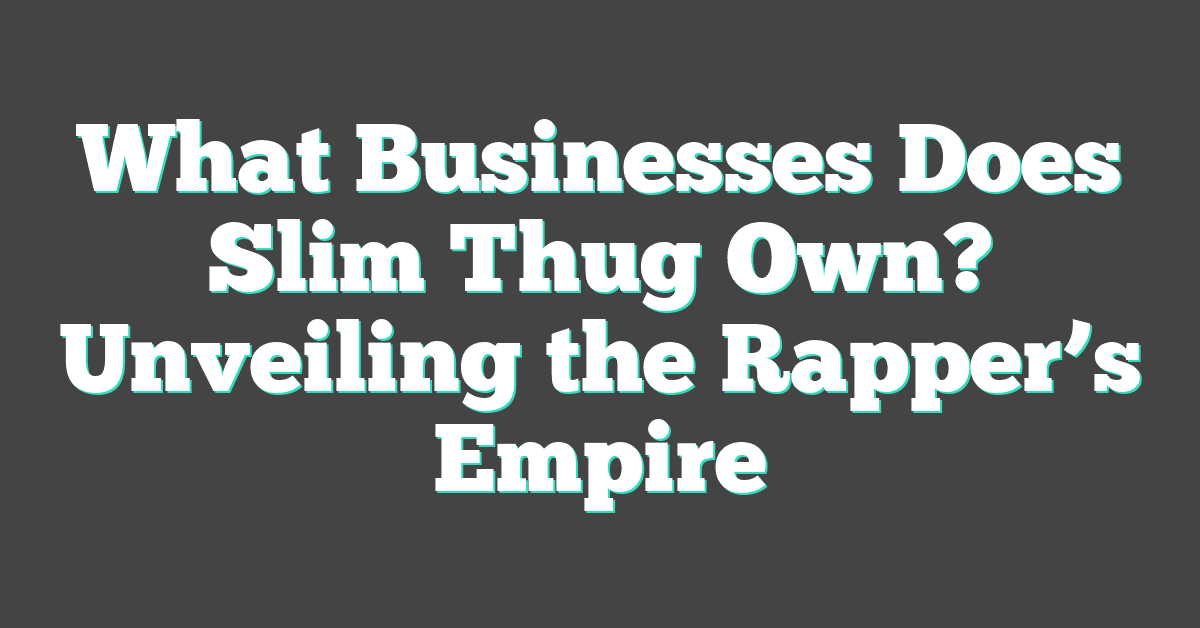Pablo Escobar, a name synonymous with the Medellin Cartel, wasn’t just a notorious figure in the underworld; he was also a businessman with a portfolio that extended beyond the illegal narcotics trade. They say money knows no bounds, and Escobar’s ventures were a testament to that adage.

From real estate to soccer teams, Escobar’s business interests were as diverse as they were surprising. He had a knack for investing in various sectors, creating a facade of legitimacy that often blurred the lines between his legal and illicit activities.
Pablo Escobar’s Business Empire Begins
Pablo Escobar, a name synonymous with wealth and controversy, embarked on his entrepreneurial journey with a rather unorthodox mix of operations. Originally starting with small-scale street crime, Escobar quickly realized the lucrative potential of the drug trade. But his ambitions didn’t stop at illegal pursuits; he was intent on creating a business empire that would extend far beyond the shadows of the underworld.
His first step towards legitimacy involved Diversifying His Investments. Escobar astutely poured money into various sectors of the economy. From real estate development to owning a fleet of aircraft for his drug transport network, he used these businesses to launder his vast narcotics earnings. As his wealth climbed, so did his notoriety, but Escobar’s attention to facade and appearance allowed him to operate in plain sight.
- Real Estate Development
- Aircraft Acquisition
- Narcotics Transportation
Alongside these, Escobar owned numerous homes and even a zoo stocked with exotic animals from around the globe. His hacienda, Napoles, became both his personal kingdom and a symbol of his immense power. The property included a private airstrip, which played a crucial role in his cocaine trafficking operations, allowing him direct control over a key link in his supply chain.
Sports: A Universal Love and Business Venture alike—Escobar’s entry into the world of soccer was not just a move to launder money but also reflected his genuine passion for the sport. His involvement in the soccer teams served as another layer in his complex web, blending his criminal profile with that of a respected sports patron.
- Soccer Team Investments
The splash Escobar made in legitimate businesses created jobs, funded public projects, and earned him a Robin Hood-like image in the hearts of many Colombians. He was seen as a benefactor, someone who gave back to the community, even as his cartel was responsible for the horrors of the drug war. This duality further allowed him to mask his illicit activities behind a veneer of benevolence and made his business empire a paradoxical blend of light and shadow.
Building the Medellin Cartel
The Medellin Cartel, an empire of unimaginable wealth and influence, didn’t blossom overnight. Its roots took hold through a series of strategic moves orchestrated by none other than Pablo Escobar. He had a knack for business that could turn even the most mundane opportunity into a goldmine.
Escobar’s early days were marked by small-scale criminal activities that laid the groundwork for his later empire. He recognized the lucrative potential in the cocaine trade and set out to control it all. With an iron fist and a sharp mind, he began structuring the Medellin Cartel, ensuring each piece was properly in place.
« What Businesses Does Serena Williams Own? Unveiling Her Empowering Empire
What Businesses Does Matt Damon Own? Dive Into His Impactful Ventures »
Strategic acquisitions allowed the Cartel to manage every link of the cocaine supply chain. Airplanes, helicopters, and speedboats were procured to form a sophisticated transport network that could deftly evade law enforcement. Through this network, the Cartel could move product swiftly from the jungles of Bolivia and Peru to the insatiable markets of North America.
Investments in real estate weren’t just for laundering purposes; they served as operational hubs. Each property was chosen for its strategic value: some for proximity to transport routes, others for their seclusion. Soccer teams were also part of this investment strategy, providing a public face that drew attention away from illicit activities.
Personnel was another critical element in building the Cartel. Escobar enlisted individuals with specific skill sets. Accountants, lawyers, and enforcers—each played their role in a symphony of organized crime that was always several steps ahead of the authorities.
Through savvy business acquisitions and ruthless oversight, Escobar positioned the Medellin Cartel as the powerhouse of the drug trade. At the height of its power, the cartel counted for the bulk of the cocaine entering the United States, ensuring Escobar’s place at the top of the narco hierarchy.
Escobar’s Investments in Real Estate
Pablo Escobar’s business savvy extended well beyond the illicit. He channeled a hefty portion of his immense wealth into real estate, recognizing it as a means to launder drug money and establish legitimate cash flow. His portfolio was as diverse as it was expansive, encompassing various properties within Colombia and abroad, each playing its part in his grand empire.
Luxurious estates and residential properties peppered the countryside, offering Escobar retreats that served both as sanctuaries and strategic meeting places for cartel members. These properties were often lavish, equipped with the finest amenities to maintain a veneer of success and normalcy to outsiders. In cities, Escobar was known to own several apartment complexes and office buildings, converting them into revenue-generating assets.
Key locations include:
- Hacienda Nápoles, Escobar’s infamous estate that boasted a zoo, a fleet of luxury cars, and even a private airstrip.
- Multiple safe houses scattered around Medellin, used to ensure quick access to various parts of the city.
- Beachfront villas that provided discreet locations for smuggling operations.
Beyond Colombia’s borders, Escobar invested in real estate in the United States and other parts of Latin America, being particularly fond of Miami’s booming property market during the 1980s. Despite efforts to obscure his ownership through a web of shell companies and associates, Escobar’s stake in the Florida real estate market was significant. This was a tactical play, creating safe havens and laundering points within the US itself, which was also Escobar’s primary market for cocaine.
Venturing further, Pablo had properties that served as peculiar novelties such as entire islands in the Caribbean. These not only functioned as luxurious getaways but also critical points for drug transit routes.
Throughout his reign, Escobar’s real estate investments echoed his ambition and the magnitude of his operations. They were more than just property—they were cogs in the machinery of a multibillion-dollar empire, tools to maintain privacy, and appearances while facilitating the less savory aspects of his business ventures.
The Surprising Relationship Between Escobar and Soccer
Pablo Escobar’s empire extended far beyond the conventional confines of discrete businesses and luxury assets. His love for soccer was more than just a pastime; it played an instrumental role in both public relations and his criminal enterprise. Soccer connected Escobar to the Colombian people and allowed him to launder money through club ownership and sponsorships.
Atlético Nacional, the Medellin-based soccer club, is where Escobar’s influence in the sport is most evident. Although not officially on record as the owner, it was well-known that Escobar had a significant role in the club’s finances and decision-making process. With a seemingly infinite source of funds, Atlético Nacional attracted top talent and rapidly improved, which furthered its success both domestically and internationally.
- Sponsored soccer teams
- Funded soccer events
- Built soccer fields for communities
Escobar also understood the power of soccer as a tool for community engagement. He funneled his illicit earnings into the sport at the grassroots level, constructing soccer fields and sponsoring local teams. His involvement garnered goodwill among the populace, painting him as a patron of Colombia’s beloved national sport and diverting attention from his criminal activities.
The intertwining of soccer with his business strategies illustrates the depth of Escobar’s web, where legitimate activities and illegal operations blurred. The drug lord’s funding impacted Colombian soccer greatly, affecting the perceptions of teams and games due to the lingering association with his tainted legacy.
Escobar’s involvement in soccer did more than just bolster his public image; it acted as a covert mechanism to further his empire. Money laundering and the manipulation of soccer matches became tools in his expansive toolkit. He managed to interlace his passion for soccer with his business acumen, leaving an indelible mark on both the sport and the country’s economy, weaving a complex narrative that goes beyond the pitch and reaches into the heart of his criminal operations.
The relationship between Pablo Escobar and soccer is emblematic of his strategy to embed himself in the fabric of Colombian culture, using the nation’s love for the game as a veil for his illicit activities. His influence in the sport remains a controversial chapter in the history of Colombian soccer.
Expanding Into other Industries
Pablo Escobar’s reach didn’t just end at real estate and the soccer field. He had an insatiable appetite for diversifying his portfolio and made certain his empire touched several sectors of the economy. Besides the widely known narcotics trade, Escobar ventured into the aviation industry. He owned airplanes and helicopters, vital to smuggling operations. These aircraft weren’t just practical but also symbolized immense wealth and influence.
Aviation was merely one piece of the puzzle. Escobar’s interests also extended to the automobile industry. He invested in creating a network of taxi companies across Colombia, which served dual purposes. On the front, they were honest businesses serving daily commuters, but behind the scenes, they acted as a covert transportation network for his illegal contraband.
Among other ventures, Escobar dabbled in the agricultural sector. He owned vast tracts of land wherein he cultivated different crops. It’s speculated that these farmlands were another layer of his laundering operation, converting illicit earnings into seemingly legitimate agricultural profits.
- Airplanes and helicopters for transport and smuggling.
- Taxi companies for covert illegal activities.
- Agricultural farmlands for laundering money.
But it didn’t stop there; Escobar’s business acumen led him to the world of luxury. He amassed a collection of opulent homes and even owned a zoo with exotic animals on his estate, Hacienda Nápoles. These extravagant possessions served as a tool to bolster his standing as a legitimate businessman in the eyes of the public.
Escobar’s expansion into various industries demonstrates a strategic approach to embedding his illicit activities within the veneer of normalcy. His enterprises, though seemingly unconnected, were cogently woven together, making it incredibly challenging to untangle the legal from the illegal. The impact of these investments contributed significantly to Colombia’s economy, painting a complex portrait of the man behind the myth.
Conclusion
Pablo Escobar’s vast business empire, though a facade for his illegal ventures, played a pivotal role in shaping Colombia’s economic landscape. His strategic investments in various industries, from real estate to soccer and beyond, were more than just a smokescreen. They left an indelible mark on the country, weaving a complex tale of wealth, power, and influence. Escobar’s life and business dealings continue to fascinate and serve as a stark reminder of the thin line between legitimacy and criminality.
Frequently Asked Questions
What industries did Pablo Escobar invest in?
Pablo Escobar’s investments spanned over several industries, including real estate, soccer, aviation, taxi companies, and agriculture. These ventures were often fronts for his illegal activities.
How did Pablo Escobar use his business empire to support his illegal activities?
Escobar used his diverse business empire as a façade to legitimize his income and disguise the profits from his illegal activities, integrating them within the fabric of the local economy.
Did Pablo Escobar’s business ventures have a legitimate side?
Yes, Pablo Escobar’s investment in industries like real estate and agriculture, as well as his ownership of properties and a zoo, helped to cultivate an image of legitimacy.
What impact did Pablo Escobar have on Colombia’s economy?
Pablo Escobar’s investments and illicit activities had a significant impact on Colombia’s economy. His strategic embedding of criminal operations within legitimate businesses affected both local and national economic landscapes.
Was Pablo Escobar involved in sports?
Yes, Pablo Escobar had a surprising relationship with soccer, investing in the sport and using it as another channel to launder money and gain public favor.











